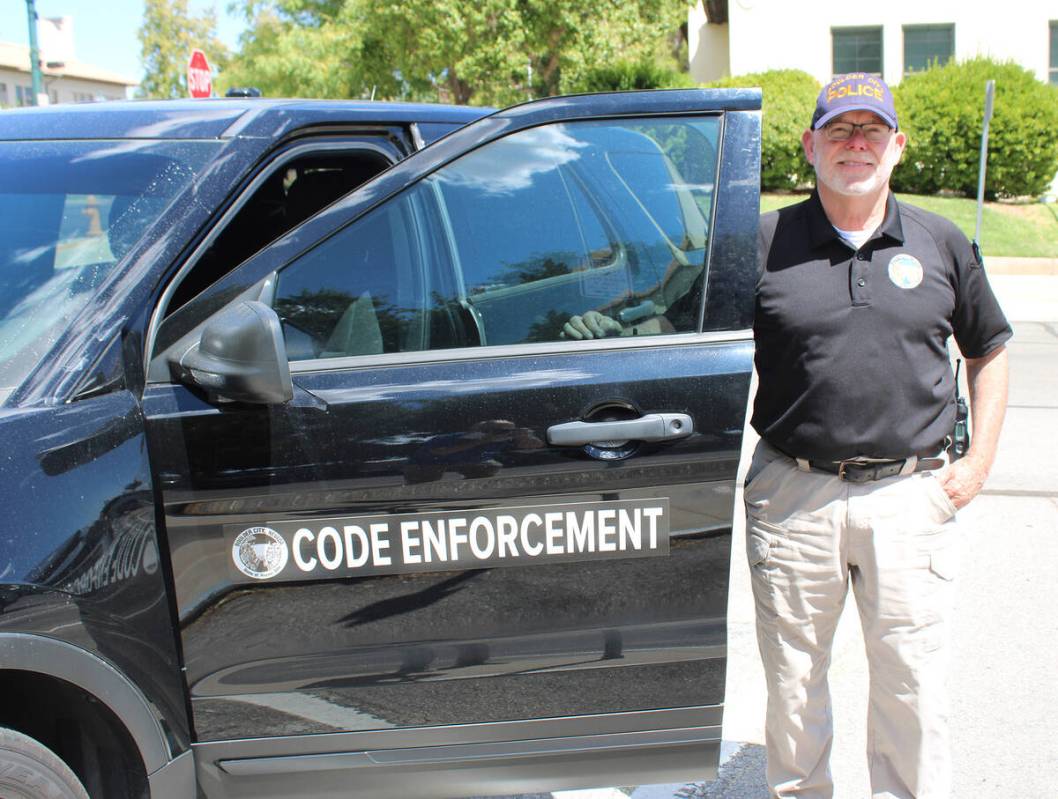
It may sound like a riddle, but Pat Richardson is not a police officer yet he works for the department. He doesn’t seek out illegal activities, but he can issues citations.
Any guess as to what he does?
For the past seven years he’s served as the city’s code enforcement officer after more than 30 years as a police officer in California and Arizona.
“When I was 60, my wife sat me down and told me I’m too old to be doing this cop thing, so we decided we wanted to move and be closer to my brother in Henderson and my daughter and grandchildren, who were in Vegas,” he said. “I was looking for a part-time job and I saw an ad online for here in Boulder City and saw an opening for support police aide to run the crossing guard and volunteer programs (which he still does).”
Within a couple of weeks of being hired, he was asked to assist with code enforcement, which Richardson admits, he had little idea as to what that entailed. He educated himself on the city codes and process when handling cases. A few months later, he was promoted to a full-time position. He now splits his time between code enforcement and the other responsibilities he was originally hired to do. Because of the workload, Richardson was then joined by a fellow retired police officer, Steve Staley, who works part-time and assists with code enforcement.
“If you get a case that really helps somebody and solves an issue, while making a neighborhood even better, it’s enjoyable to see a resolution to a problem,” Richardson said. “Basically, you’re a problem solver. I still get to do investigations, which I like. The skills of having been a police officer translate to this job. The only difference being, in code enforcement the goal is to resolve the issue while with police work, it’s to solve crimes. Voluntary compliance is the goal of code enforcement.”
Another unique aspect of code enforcement is that they are not proactive but rather reactive. Meaning, he does not patrol the streets looking for violations. As he put it, if he did that, there are some streets he’d spend several weeks on investigation of violations.
According to city code, “The mission of the Boulder City Code Enforcement Program is to promote and maintain a safe and desirable living and working environment. Through the efforts of the code enforcement officer, the city is able to maintain and improve the quality of our community by administering a fair and unbiased enforcement program to correct violations of municipal codes and lane use requirements. Additionally, the code enforcement program works with residents, neighborhood associations, public service agencies and city departments.”
Code violations can include a variety of things but the most common calls Richardson receives are for private property maintenance, weeds, debris in a yard, junked inoperable vehicles, trees blocking the sidewalks or signs and distressed properties that have not been kept up, to name a few.
The ways it works is, they receive a complaint and make sure it’s a code violation. Staley then goes to the home that was complained about and let them know they are in violation. They will then be given time to come into compliance and will then return to see if they have complied. While most comply, if they don’t, Richardson sends them a notice. While it’s rare, the homeowner can be issued a civil citation.
“Almost everyone complies or at least tries to,” he said.
Another item added to code enforcement’s plate as of late are short-term vacation rentals, which the city council banned earlier this year. Like other violations, Richardson said thy are reactive and don’t seek out violators.
When a complaint is received and he’s able to confirm that the home is being used as a vacation rental, a notice will be sent and the homeowner is given a month to comply. So far, he’s had about seven STR cases, and all but one either complied or turned the house into a long-term rental of 30 days or more. If they don’t comply, they can be fined.
“The owners who live out of state were not aware of it,” he said of the new law. “But most of the others know.”
Richardson said that at last count, he knows of 13 STRs in Boulder City. By comparison, Sedona, Ariz., with a population of less than 10,000, has well over 1,000 vacation rentals. In Arizona, however, communities cannot ban the practice of vacation rentals after the passing of a state law nearly a decade ago.
“A lot of people who report them simply don’t like the idea of a vacation rental near them,” he said. “Or that it’s causing a nuisance. If it’s a major nuisance, I tell them they need to contact the police department. I’m sure there are more out there but it’s challenging because people don’t tell me.”